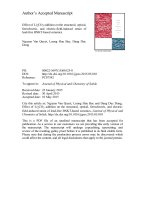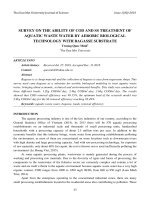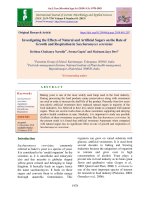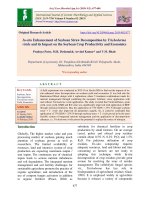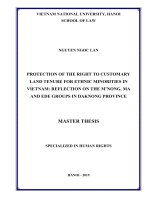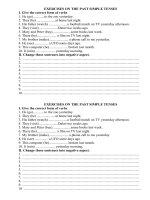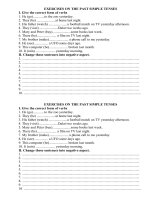dethivaolop10chuyenAnhHatinh20101011
Bạn đang xem bản rút gọn của tài liệu. Xem và tải ngay bản đầy đủ của tài liệu tại đây (117.29 KB, 4 trang )
<span class='text_page_counter'>(1)</span><div class='page_container' data-page=1>
<b>Sở giáo dục - đào tạo</b>
<b> hà tnh</b>
<b> chớnh thc</b>
<b>Kỳ thi tuyển sinh lớp 10 chuyên năm häc 2010-2011</b>
<b>M«n thi: TiÕng Anh</b>
Thời gian làm bài: 120 phút
<i>(không kể thời gian giao đề)</i>
<b>Lưu ý: Thí sinh làm bài vào tờ giấy thi</b>
Khơng được sử dụng bất kì loại tài liệu nào
<i><b>I. Choose the word whose underlined part is pronounced differently from that of the others.</b></i>
1. A. stopped B. ordered C. prepared D. cleaned
2. A. without B. strengthen C. clothing D. father
3. A. soap B. coat C. broad D. road
4. A. noun B. sound C. country D. count
5. A. wants B. says C. looks D. laughs
<i><b>Choose the word with different stress pattern by circling the letter A, B, C, or D.</b></i>
6. A. explain B. begin C. promise D. attack
7. A. listen B. worker C. symbol D. attend
8. A. certain B. result C. litter D. duty
9. A. tradition B. tendency C. confident D. century
10. A. information B. disappointed C. professional D. repetition
<i><b>II. Give the right form of the verbs in brackets.</b></i>
1. The students (write) ...busily when Mr.Hung (go)……… to get a book he had left in
the office.
2. “I realize I should not have said that.” “That’s all right. I (forgive) ... you.”
3. Many women in the countryside are now used to (treat) ... unfair in their family.
4. When I (hear) ... the noise, I (get) ... up to see what had happened.
5. He set off alone a month ago and (not hear) ... from since then.
<i><b>III. Choose the most suitable word or phrase to complete each sentence.</b></i>
1. I remember my grandmother ___________ knitting for hours.
A. is sitting B. will sit C. had sat D. would sit
2. There’s __________ lot of work! Do you think you could help me?
A. such a B. so C. so a D. such
3. If it ___________ the children, the life would be so tedious.
A. were B. weren’t for C. were for D. isn’t
4. My mum wishes I ___________ my clothes everywhere in the room.
A. don’t put B. won’t put C. wouldn’t put D. hadn’t put
5. Hurry up, __________? We haven’t got all day.
A. don’t you B. have we C. do you D. won’t you
6. She played the piano beautifully ___________ she was not feeling very well.
A. even though B. despite C. but D. in spite of
7. I have been looking for this book for months and ___________ I have found it.
A. in time B. at last C. at the end D. at present
8. __________ weather! We have to cancel our picnic.
A. How terrible B. What a terrible C. How a terrible D. What terrible
9. He wants __________ sugar in his tea.
A. a little B. little C. a few D. few
10. The boy always does his homework before class ___________ by the teacher.
A. so that not to be punished B. so as to be punished
</div>
<span class='text_page_counter'>(2)</span><div class='page_container' data-page=2>
<i><b>IV. Fill in the correct prepositions.</b></i>
1. This house has been... sale for months.
2. I rang him... accident - I was trying to ring my mother.
3. We’ve been friends for years because we have a lot... common.
4. He described the plan to me... detail.
5. She is very popular... her classmates.
<i><b>V. Complete the second sentence so that it has a similar meaning to the first sentence. Use the</b></i>
<i><b>word given and other words to complete each sentence. You must use between two and five</b></i>
<i><b>words. Do not change the words given. </b></i>
1. He doesn’t drive because he’s afraid of having an accident. fear
He doesn’t ... an accident.
2. She’s a talented dancer and a good singer as well. only
Not ... dancer but she’s also a good singer.
3. Sally behaves better than Sue. well
Sue is ... Sally.
4. It was difficult for Jim to overcome his problems. difficulty
Jim ... his problems.
5. All flights were cancelled because there was a strike. due
All flights ... strike.
6. “Let’s try that new Thai restaurant”, she said. trying
She ... new Thai restaurant.
7. How long ago did he move in? since
How long ... in?
8. I like traveling by car than by train. rather
I prefer to ... by train.
9. Mary hates vampire films and so does Peter. nor
Neither ... vampire films.
10. I’m not as frightened of flying as I am of ghosts! than
I’m ... I am of flying.
<i><b>VI. Read the text below. Use the word given in brackets to form a word that fits in the space.</b></i>
<i><b>There is an example at the beginning (0).</b></i>
<b>E-mail</b>
There can’t be many people who are (0 - aware)...unaware... of e-mail, even if they
have never actually sent one. Although there are some (1 - similar) ...between e-mail
and letters, there are also many differences. The first is that email is delivered (2
<b>-instant) ..., so it can be a very (3 - effect) ... means of communication when</b>
speed is important. This speed means that e-mail is more (4 - practice) ... for
communicating over large distances. Another difference is that email tends to be (5
<b>-relative) ... informal. People are much more likely to use language which they would</b>
consider (6 - suit) ... for a formal letter. Words spelled (7 - correct) ... in an
e-mail are less likely to be checked than in a letter. One (8 - explain)... for this is that an
e-mail seems to be less permanent than something written on paper. We can be sure that the
future (9 - develop) ... of e-mail will have all kinds of (10 - expect) ... effects
on the way we communicate.
</div>
<span class='text_page_counter'>(3)</span><div class='page_container' data-page=3>
<i><b>VII. Read the text below and decide which answer A, B, C, or D, best fits each space.</b></i>
<b>The history of football</b>
Football, or soccer, which is so popular all over the world, dates back to the Middle Ages.
At that (1) ... it was very different from the game we play today. Any number of players
could (2) ... part and the matches usually developed into a free-for-all. In its modern
(3) ..., football is less than two hundred years old.
In 1846, the first rules to govern the game were drawn (4) ... at Cambridge
University. The number of players was (5)... to 11 per side, which made things much
more (6) ... than before. Later, in 1863, the Football Association was (7) ... up
to help promote the game in Britain.
The game is played on a grass or artificial (8) ... with a goal net at each end.
The (9) ... is to move the ball around the field, (10) ... the feet or head, until a
player is in a (11) ... to put the ball into the net and score a goal.
Professional football is not only the most popular (12) ... sport in the world, (13)
... also more people actually play football themselves than any other team sports. In
1904, FIFA, the world governing (14)... of football, was founded. It organizes the
World Cup tournament every four years. Other kinds of football are popular, but less
(15) ..., for example American Football and Australia Rules Football.
1. A. season B. time C. term D. stage
2. A. play B. make C. take D. do
3. A. form B. shape C. fashion D. pattern
4. A. out B. away C. up D. in
5. A. limited B. checked C. counted D. defined
6. A. tidy B. neat C. arranged D. orderly
7. A. put B. set C. born D. called
8. A. court B. pitch C. course D. track
9. A. object B. reason C. focus D. purpose
10. A. by B. to C. of D. with
11. A. place B. point C. position D. spot
12. A. witness B. audience C. spectator D. viewer
13. A. because B. but C. while D. so
14. A. body B. band C. collection D. group
15. A. vast B. widespread C. enormous D. large
<i><b>VIII. Read the text below and think of the word which best fits each space. Use only one word</b></i>
<i><b>in each space.</b></i>
<b>The book in the 21st<sub> century</sub></b>
How many times in the last hundred years or so have people talked of the imminent death
of the book? Films (1)... an early threat, because they were so effective at telling stories
in a visual way. Next there was radio, (2)... swept into the mid-twentieth century and
provided such alternatives to books (3)... drama, documentaries, and discussions. When
television arrived, many people believed that it (4)... finish the book off. Nowadays,
(5)... the threat by TV, the book is thought to be endangered by computers and the
Internet, and by other technological attractions (6)... the CD and the video game, too.
Surely there are now enough reasons (7)... the book ought to be dead,
(8)... at least very badly injured. If so, why does it not show proper respect for these
reportedly (9)... literate times and die out? There is clearly more than a (10)...
answer to this question. Firstly, we have more leisure time than we (11)... to, and people
are generally living longer, which means there is more time to do more (including reading
books). As (12)... as this, there is the strength of the book as a tradition. We are all too
dismissive of traditions in our modern world, but they can have a very strong pull (13)...
</div>
<span class='text_page_counter'>(4)</span><div class='page_container' data-page=4>
us. Added to this, the book is such a practical tool: it doesn’t cost too (14)..., it is usually
small enough to carry around, and it can easily (15)... revisited. We will never go without
books, because they have served us so well for so long.
<i><b>IX. Read the passage and choose the correct answer A, B, C, or D.</b></i>
Because writing has become so important in our culture, we sometimes think of it as
more real than speech. A little thought, however, will show why speech is primary and writing
secondary to language. Human beings have been writing for at least 5000 years; but they have
been talking for much longer, doubtless ever since there have been human beings.
When writing did develop, it was derived from and represented speech, albeit
imperfectly. Even today there are spoken languages that have no written form. Furthermore, we
all learn to talk well before we learn to write; any human child who is not severely handicapped
physically or mentally will learn to talk: a normal human being cannot be prevented from doing
so. On the other hand, it takes a special effort to learn to write; in the past many intelligent and
useful members of society did not acquire the skill, and even today many who speak languages
with writing systems never learn to read or write, while some who learn the rudiments of those
skills do so only imperfectly.
To affirm the primacy of speech over writing is not, however, to disparage the latter. One
advantage writing has over speech is that it is more permanent and makes possible the records
that any civilization must have. Thus, if speaking makes us human, writing makes us civilized.
1. The author of the passage argues that …
A. writing has become too important in today’s society.
B. speech is more basic to language than writing.
C. everyone who learns to speak must learn to write.
D. all languages should have a written form.
2. According to the passage, writing …
A. is imperfect, but less so than speech.
B. represents speech, but not perfectly.
C. developed from imperfect speech.
D. is represented perfectly by speech.
3. In the author’s judgement …
A. writing has more advantages than speech.
B. speech is essential but writing has important benefits.
C. speech conveys ideas less accurately than writing does.
D. writing is more real than speech.
4. In order to show that learning to write requires effort, the author gives the example of …
A. people who learn the rudiments of speech.
B. people who speak many languages.
C. intelligent people who couldn’t write.
D. severely handicapped children.
5. According to the author, one mark of civilized society is that it …
A. affirms the primacy of speech over writing.
B. affirms the primacy of writing over speech.
C. teaches its children to speak perfectly.
D. keeps written records.
_____________ <b>The end</b> _____________
</div>
<!--links-->



